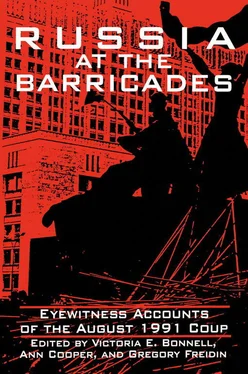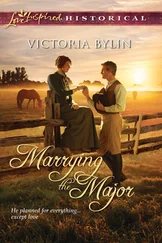Though often dominated by old-guard elements (including Party bureaucrats, industrial managers, and military officers), the new legislatures provided a powerful forum for discussion of a wide range of political opinion. Most important, they made it possible for democratic politicians, like Andrei Sakharov and Boris Yeltsin, to speak directly to the Soviet public. Incessant television coverage of parliamentary debates and political commentary practically took over the air waves and the print media. The secretive or largely ceremonial politicking of the Soviet era gave way to full-blown political theater, open to all. For a while it seemed that the whole country was glued to television sets, watching the thrust and parry between Gorbachev and Sakharov and clashes between the liberal deputies of the Interregional Group and the conservatives of the “Soiuz” (Union) faction. In the process, the political horizons of the attentive public expanded so much that what seemed only yesterday a daring political move appeared today as an exercise in timid half-measures—and would be seen tomorrow as a betrayal of democracy.
The heady atmosphere of those days was propitious for the creation of voluntary associations, and they quickly proliferated during the Gorbachev era, evolving into a multitude of political parties and movements with diverse aims. These opportunities for open expression and political involvement helped to draw people into new forms of activism in the public sphere. At first encouraged, protected, indeed nurtured by glasnost and perestroika, the new political activists eventually began to chafe under the restrictions implicit in these policies. Little by little, they distanced themselves from Gorbachev, whose position (or, some would say, convictions) did not allow him to stray too far from the center of the Soviet political spectrum.
Nowhere was this process more evident than in the Baltic republics, where the first advocates of glasnost and perestroika soon emerged as champions of national independence. In a matter of months after the first free elections, this phenomenon spread throughout the Soviet Union, not excluding its heartland, the largest republic of them all—the Russian Federation.
At the republic level, the new legislative bodies, in which former dissidents sat side by side with old-style Soviet bosses, did not take long to develop their own political dynamic. The “democrats,” who were gaining in authority at the expense of the Party but still had little power, and Party apparatchiks, who held on to the levers of power but were losing their mantle of authority, found common ground on issues of nationalism—the ideological heir of communism in the modem world. Across the Soviet Union they formed powerful coalitions to challenge the authority of “the center,” namely, the top Soviet political elite presided over by Gorbachev. By the summer of 1991, many republics, acting through the newly elected legislatures, had declared their sovereignty. Among them was the Russian Soviet Federated Socialist Republic, led by its newly elected President, Boris Yeltsin.
For the first time since the revolution of 1917, the integrity of the empire was threatened from within. Whether they sought disintegration or opposed it, most responsible and foresighted politicians, among them Gorbachev and Yeltsin, understood that the old Union structure had to be replaced by a new arrangement that would transfer much of the center’s power to the republics. This became especially clear after Moscow’s attempt to overthrow the nationalist government in Lithuania in January 1991 ended in bloodshed and failure. In an effort to institutionalize the new status quo in relations with the center, Gorbachev and the heads of nine republics (the Baltic states, Moldova, Georgia, and Armenia did not participate) drafted a new Union Treaty, initialed the final version of it, and agreed to have it signed on August 20, 1991. It was to prevent this from coming to pass that opponents of change attempted their coup d’état on August 18. [3]
Another important aspect of perestroika was the program of economic restructuring. Although the Gorbachev government failed to move decisively in the direction of a market economy, it did create opportunities for certain types of private enterprise, known by the catch-all term kooperativy , or cooperatives. This easing of central controls over economic activity made it possible for people to leave employment in the state sector for the first time since the 1920s, and by August 1991, new groups of private entrepreneurs had proliferated throughout the country.
* * *
It should not be surprising that the policies of glasnost and perestroika found some of their most ardent supporters among urban, educated, “middle-class” citizens who appreciated—and took advantage of—the new opportunities for individual and collective activity in the economy and in politics. This group emerged as a critically important new force in the country during the Gorbachev era.
At the same time, three pillars of the old system still clung to the resources and power, if not the authority, that they had enjoyed throughout the Soviet era: the military-industrial complex, which included a large part of the heavy industrial sector of the command economy; the all-pervasive Committee for State Security, the KGB; and above it all, the Communist Party of the Soviet Union, or more precisely its central apparatus, which controlled virtually all top government appointments from the revolution of 1917 until August 1991. Whether for lack of will or lack of power, out of tactical considerations or out of conviction, and most likely for all of these reasons at once, Gorbachev did not break with the Communist Party. Yet his policies continuously undermined the position and authority of the Party apparatus and fostered the emergence of reform groups within the Party at all levels as well as rival political movements outside the Party.
Until its suspension on August 24, 1991, the Communist Party was the sole political organization spanning the entire Soviet Union. Using the art of political maneuver of which he was a consummate practitioner, Gorbachev tried to enlist the Party in the cause of reform and to use its organizational resources as a counterweight to the centrifugal forces that were pulling the country apart. This paradox lies at the heart of Gorbachev’s achievement, but it was the cause of his failure as well. In the year preceding the coup, grassroots political forces that Gorbachev himself had helped to unleash were becoming increasingly radicalized in frustration over the seemingly slow pace of change. At the same time, conservative elements within the Party were stiffening their resistance to reform. To placate them, Gorbachev retained key conservative figures in his government even as he was preparing to sign the new Union Treaty that would have dealt a fatal blow to their power.
As political forces polarized, Gorbachev moved first in one direction and then the other. The result was that Gorbachev appeared timid and indecisive as he repeatedly drew back from the bold strategies proposed by some of his more radical economic advisers. At the top, there was a gradual attrition among liberal politicians, including those most intimately associated with the post-1985 reforms—Aleksandr Yakovlev, Eduard Shevardnadze, and Vadim Bakatin. Foreign Minister Shevardnadze’s resignation from his post drew world attention; yet his dramatic warning of an impending coup d’état—“Dictatorship is coming!”—spoken from the high rostrum of the Congress of People’s Deputies in December 1990, seemed to fall on deaf ears. Gorbachev’s apparent acquiescence in the use of brute force to suppress the nationalist movements in the Baltic republics, and, especially, the bloody attack on Lithuania’s parliament building in January 1991, cost him support among the democrats while not winning him many friends among the conservatives, who had grown to mistrust him personally as much as they mistrusted his policy of reform.
Читать дальше












